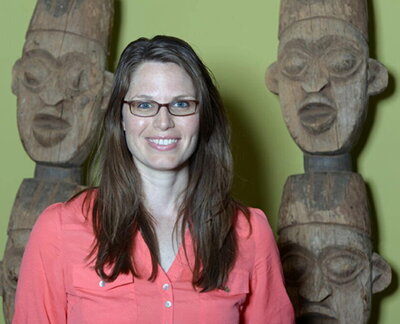
Rebecca Vaughn, MA, African Studies, 2012

Rebecca at the David Owsley museum, standing in front of palace support columns from Cameroon, 1900-1950, built by Bamileke, Babanki, or Kom People
Rebecca Vaughn recently accepted a position as registrar and collection manager at the David Owsley Museum of Art (DOMA) at Ball State University in Muncie, Indiana. Rebecca's responsibilities include assessing and planning for storage and collection needs and securing shipments and processing recent acquisitions as well as coordinating with staff and interns in preparing objects for exhibition. In maintaining the museum records as registrar, Rebecca also fields research requests and organizes domestic as well as international loans for upcoming exhibitions. Totaling around 11,000 objects, the DOMA collection is global in scope with artworks from Asia, Africa, Oceania, the Americas, and Europe. Artworks date to ancient, medieval, Renaissance, 17th century, 18th century, 19th century, and modern periods. Highlighting works from West, Central, and East Africa, the African gallery features objects relating to themes including metalworking, beadwork, masquerades/performance art, funerary customs, and sculptures.
Earlier this fall, Rebecca married Keith Taylor, a Ph.D. graduate in Human and Community Development from the University Of Illinois at Urbana-Champaign. Keith is a Research Associate at the Ostrom Workshop in Political Theory and Policy Analysis in Bloomington, Indiana, where his work focuses on better understanding the processes of institutional, community, and economic development, specifically through optimization of organizational self-governance. Rebecca and Keith enjoy biking and gardening and are becoming more involved in community development initiatives.
Josh Mlay, MA, African Studies, 2014
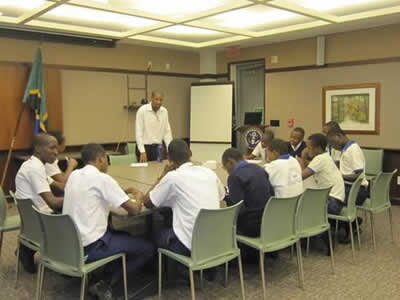
Over the past year, I have worked as a research consultant for Comprehensive Community Based Rehabilitation (CCBRT), an NGO that is based in Moshi and Dar es Salaam, Tanzania. CCBRT works to rehabilitate people suffering from various disabilities. It also provides maternal/ newborn healthcare and mobilizes and educates different stakeholders on how to improve access and care for people with disabilities in different sectors. In my role as a research consultant, my major responsibilities were to assess the relationship between poverty and disability and how that affects the life chances of people affected by both variables. In addition, I also evaluated the work CCBRT is currently doing in Tanzania to help them analyze whether their current efforts and programs are in sync with the problems people with disabilities face in terms of stigma, access to health care, physical therapy, and education and whether their partnerships with different stakeholders within the country were meeting their organizational goals.
Currently, I work as a cultural affairs assistant at the U.S Embassy in Dar es Salaam. I coordinate short-term cultural and educational exchange programs. Under my portfolio I handle the IVLP program, which is a short-term professional exchange program that targets emerging leaders and facilitates three- week extensive workshops that focus on their area of interest. These workshops focus, for example, on policy formation, monitoring and evaluation, and leadership training.
I also manage the EducationUSA program, which is geared towards helping high achieving Tanzanian students access higher education opportunities in the U.S. In this capacity, I have worked towards encouraging Tanzanian higher learning institutions to internationalize their campuses by building relationships with American higher learning institutions that send students for study abroad programs and professors who have research interests in Tanzania. We are also in the process of identifying and nominating Tanzanian professors for several fellowships in the U.S. It is my hope that this exposure will foster relationships as well as broaden perspectives, capacity, and thus scholarship in Tanzanian and American universities. Finally, I also assist with the Fulbright JSD (Junior Staff Development) fellowship program and the Mandela Washington Young African leader’s initiative.
Dr. Ifeyinwa (Ife) Onyenekwu, Education Policy, Organization & Leadership, 2015 and former African Students Organization (ASO) President
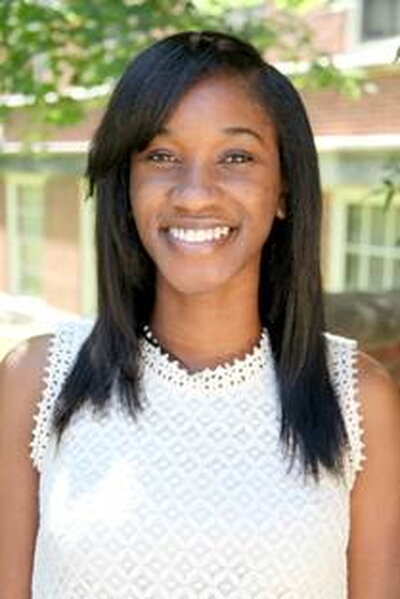
UIUC alum Dr. Ifeyinwa (Ife) Onyenekwu is currently a postdoctoral fellow at the University of Missouri-Columbia in the Department of Educational Leadership and Policy Analysis. Prior to coming to MU, Dr. Onyenekwu worked in several research, administrative, and teaching capacities. For instance, in her immediate past role she served as President of the African Student Organization and Project Coordinator for the Pathways Resource Center at the University of Illinois at Urbana-Champaign (UIUC). Her research interests center around three threads of scholarly inquiry: (a) the ensurance of equitable outcomes for all students through the P-20 education system; (b) African and African Diaspora populations in U.S. higher education; and (c) internationalization and globalization of higher education.
Dr. Onyenekwu is the recipient of numerous awards and honors such as the 2015 AERA CASE Research Proposal Award and 2015 Hardie Conference Award. She holds a B.A. in sociology and master’s degree in social work (MSW) from Louisiana State University and recently earned a Ph.D. in higher education from UIUC. She will be teaching several courses starting spring 2016 and will continue her research on topics including African and African Diaspora populations in higher education, globalization and internationalization of higher education, and student academic achievement along the P-20 education pipeline (with a focus on STEM education).
Nathaniel Moore, MA, African Studies, 2011
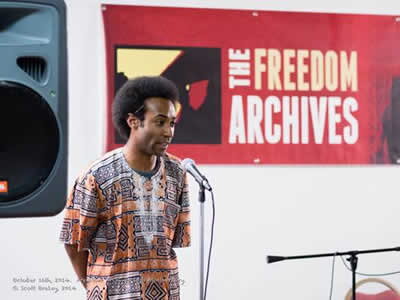
In spring 2015, I traveled to South Africa where I worked with the Right2Know Campaign (R2K), South Africa’s first post-Apartheid freedom of expression and access to information movement. Right2Know is a national umbrella organization that contains hundreds of smaller, grassroots organizations coalescing around a number of key issues including media freedom, increased access to public and private information, curtailing state secrecy, and community empowerment.
During my trip I was primarily based in Durban and was able to participate in a number of R2K meetings, demonstrations, and events which illuminated many aspects of life in South Africa hidden in previous trips. Hearing the voices and building relationships with women affected by un-regulated coal mining, seeing hostel-dwellers come together to unite around common issues, and organizing community members to demand police accountability for unrestrained violence were all important learning experiences.
My trip and experience with Right2Know was also distinctly affected by the xenophobic attacks which began in Durban and ultimately spread to Johannesburg. The most recent attacks were primarily perpetuated by Zulus against “foreigners” from a wide range of African nations: Zimbabwe, Nigeria, Ethiopia, Somalia, Malawi, the Congo (DRC), Mozambique, and others. Sparked by anti-immigrant rhetoric from the Zulu king, tensions boiled over and exploded to where non-South African Africans were chased from their shops and homes, harassed and attacked, and in some cases killed. Only pressure from other African nations and international media and vocal opposition from many South Africans finally pushed the government to staunchly condemn the violence and restore order but not before thousands had fled from their homes into internal refugee camps.
Hidden just below the surface of the anti-immigrant rhetoric were the systemic issues of rampant poverty, government corruption, and the legacy of Apartheid which has continued to perpetuate institutionalized inequality and restrict the people from redistributing the country’s sizable wealth. Additionally distressing was the obvious rebuke to the Pan-African solidarity that played an influential role in supporting African liberation struggles, and especially the South African liberation struggle. However, despite the perceived apathy of many South Africans to these attacks, I saw quite a different picture. Right2Know was one of the local organizations that worked in a support role to African communities from organizing meetings with city officials to discussing public safety, to planning marches and events in solidarity with affected communities, to disseminating real time communication updates to lawyers, activists and others; I saw Pan-Africanism at its finest. It was these experiences that highlighted the praxis of Pan-Africanism and re-enforced the importance of strengthening connections and shared work beyond national boundaries. I am truly indebted to Right2Know for all their support and solidarity.
Upon my return, an article I wrote, “The Transformative Power of Sankofa: Teaching African History Inside San Quentin State Prison, “ was published in the summer issue of New Directions for Community Colleges (Volume 2015, Issue 170, pages 57–65, Summer 2015). In this article, I reflect on my experience teaching ethnic studies inside a unique California prison, and call for college-in-prison educators to engage culturally appropriate curricula to realize the full transformative potential of the prison classroom.
Dr. Ahmed Ali Salem, MA, African Studies (2002), PhD, Political Science , 2006
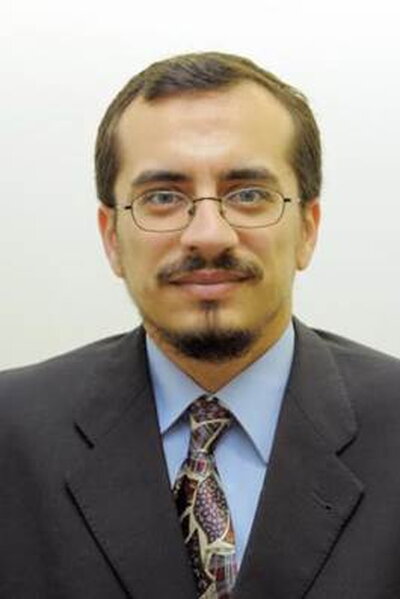
Dr. Ahmed Ali Salem, a university professor, graduated from the Department of Political Science at the University of Illinois at Urbana-Champaign in October 2006, and from the Center for African Studies in May 2002. He is an associate professor at Zayed University’s Institute for Islamic World Studies (IIWS) in the United Arab Emirates where he teaches undergraduate and graduate courses. Having taught more than a couple of thousands of students at Zayed University since his appointment in 2006, he has often been among the teachers ranked as best by their students. During his long career at Zayed University, he taught courses in the MA programs in Islamic World Studies, Islamic Economics and Wealth Management, and Diplomacy and International Affairs. He also served as the IIWS Assistant Director, chaired the University and IIWS Graduate Programs Committees, and coordinated two international academic conferences, a nationally-funded research project, an MA program, a general education course, and college and department seminars series. Serving the profession, he reviewed articles for publication and chaired the state-appointed Committee of External Reviewers of the only Bachelor Program of Political Science in the Kingdom of Bahrain (2014-2015).
Dr. Salem’s research agenda includes theories and methods in International Relations; Islamic reform thought and movements; modern history of Islamic-Western, and Arab-African relations; and conflicts and cooperation in Africa and the Arab and World. He has authored and edited fifty books, book chapters and journal articles, and presented fifty conference and seminar papers, in both Arabic and English. His recent English language book chapters were published by Routledge (2016), Africa Institute of South Africa (2016 and 2011), Lexington Books (2014), and Emirates Center for Strategic Studies and Research (2012). His English language journal articles appeared in Encounters, Global Studies, and American Journal of Islamic and Social Sciences. His Arabic translation of Jeremy Black’s A History of Diplomacy was published in 2013.
His most recent book, What Is Constructivist about Realism? Constructivist Critiquing of the Realist Paradigm in International Relations (2012), is a critical analysis of the classic works of leading realist theorists, namely, Carr, Morgenthau, and Waltz, as well as realist attempts to fix serious problems of Waltz’s theory in order to save the realist paradigm in international relations. http://www.amazon.com/Constructivist-About-Realism-Ahmed-Salem/dp/3659209724/ref=sr_1_2?s=books&ie=UTF8&qid=1344947596&sr=1-2
His first book, International Relations Theories and International Organizations: Realism, Constructivism, and Collective Security in the League of Arab States (2008), develops and tests a set of realist and constructivist hypotheses on collective security actions of international organizations. He used the Arab League’s responses to the Iraq-Kuwait crises in 1961 and 1990 as case studies. http://www.amazon.com/International-Relations-Theories-Organizations-Constructivism/dp/3639031903/ref=sr_1_3?ie=UTF8&qid=1350462179&sr=8-3&keywords=Ahmed+Ali+Salem.
The book was translated into Arabic and published by the Doha-based Arab Center for Research and Policy Studies (2015).
Dr. Salem was awarded the Exemplary Performance Recognition at Zayed University (2008), and his biography is published annually in Marquis Who’s Who in the World since 2010. He appears occasionally on Arabic media outlets.